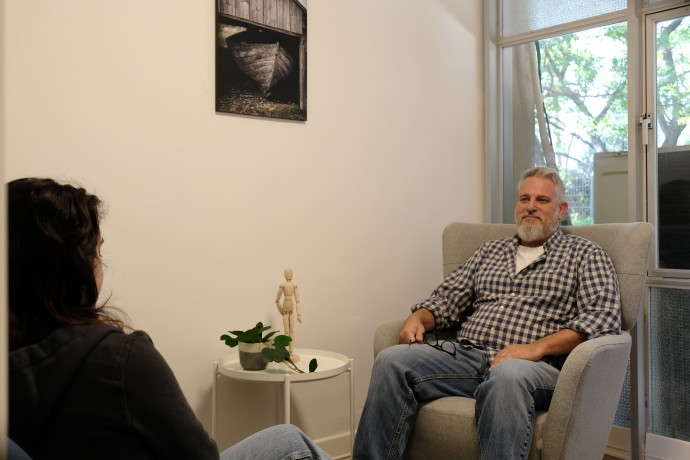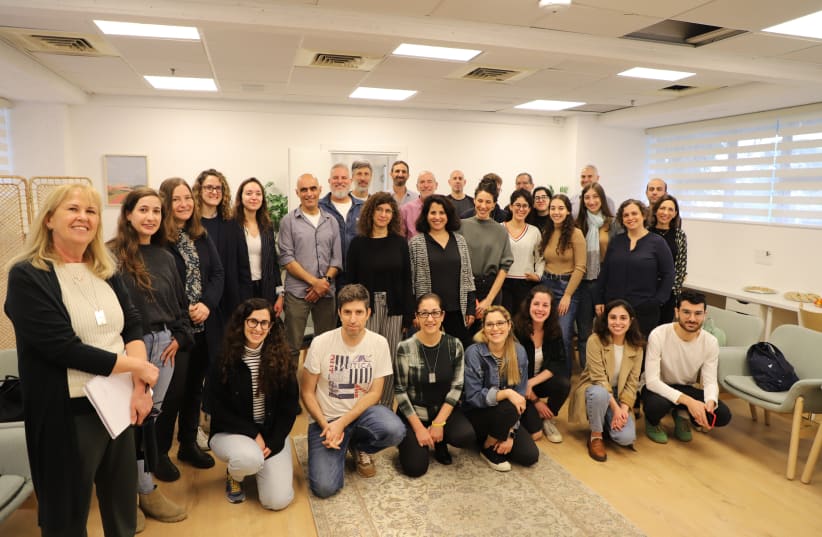Trauma, as defined by the Merriam-Webster dictionary, means “a disordered psychic or behavioral state resulting from severe mental or emotional stress or physical injury.”
Beginning with the Hamas terror attacks on Oct. 7 and continuing with Israel’s military campaign in Gaza, the atmosphere in the country over the past three months has been one of almost continuous trauma for many sectors of Israel’s population.
In an effort to handle the expected upsurge in trauma patients throughout Israel, on January 1 Tel Aviv University opened a post-traumatic stress disorder (PTSD) clinic at the university, which is being operated by TAU’s National Center for Traumatic Stress and Resilience.
The clinic is one component of the planned center, which will include a vast clinical research component, a training center, and a policy-making center for traumatic stress and PTSD. One year ago, construction commenced on the Miriam and Moshe Shuster Building for the Center for Traumatic Stress and Resilience, including a treatment clinic, cutting-edge laboratories, and the Sam and Agi Moss Wing, which was slated to open in late 2025.
The Magazine recently interviewed Prof. Yair Bar-Haim, head of the center, who explained the importance and necessity of opening the clinic at this time.


After the traumatic events of Oct. 7, Bar-Haim realized that the schedule needed to be accelerated. “We realized that we could not wait for the original date,” he said, “and that we had to move fast to open the clinic for treatment.”
Tel Aviv University encouraged him to move up the date, provided temporary space for the clinic in the student dormitories, and authorized the necessary funding to get the clinic underway.
Bar-Haim explained that usually, clinicians wait at least a month after the occurrence of traumatic events to diagnose PTSD because the symptoms will often recede after several weeks.
“I realized we would have to be ready two or three months later with a strong clinical response. For some people in Israel, the trauma has already occurred, and it is two and a half months later. By the time they get to us, they could have PTSD, and treatment is appropriate. Providing treatment in a timely fashion can also increase the chance of a better remission.
“Therefore, it is good to start treatment as soon as possible. For example, we treat reservists who are starting to be symptomatic but are still part of their IDF units and feel capable of serving and will be moving back to Gaza. The hope is that they are resilient enough to do it; but if they show significant symptoms, they will be removed from their units and will need treatment.”
He added that setting up a clinic at the level and expertise of the TAU clinic could have easily taken several years, but due to the goodwill and hard work of the university staff, the clinic was ready to open on January 1.
Bar-Haim said that according to estimates, this year will see an increase of 30,000 new cases of PTSD in Israel. “Even before the war started, the mental health system, in both the private and public sectors, was overwhelmed.”
TAU moved quickly and hired nine of the most experienced PTSD therapists in Israel, and the clinic now has 33 mental health professionals.
“It will be the largest clinic specializing in PTSD in Israel, and we hope to provide effective evidence-supported treatment to a large number of patients,” he said.
The clinic will be led by Dr. Ofir Levi, formerly commander of the IDF’s Unit for PTSD, and currently teaching at TAU’s Bob Shapell School of Social Work. The National Center for Traumatic Stress and Resilience is headed by Bar-Haim of TAU’s School of Psychological Sciences.
While the content and personal experiences of trauma from this war are similar to those of other conflicts, Bar-Haim said that the difference is the large number of those who have experienced trauma.“The magnitude of the events, the number of people suffering, and the circles that surround them are so large, that it makes it a different experience on the national level. Everyone has their own child or nephew or knows someone in Gaza or someone who is being called up, or died, or was wounded. The circles are very large. That’s the difference.”
The clinic will treat large numbers of civilians and reserve soldiers suffering from PTSD as a result of the war or other causes. It will receive patients referred by the Defense Ministry and the National Insurance Institute (Bituach Leumi) at no charge. Private citizens can receive treatment after making an appointment, without a referral, for a nominal NIS 50 fee. Bar-Haim said that the clinic has set a goal of treating 1,000 patients in 2024 and an additional 2,000 in 2025.
He explained what PTSD is and how it is diagnosed: “Post-traumatic stress disorder starts with a traumatic event. Unlike other psychiatric disorders that do not require an event in reality, PTSD requires an actual event in reality. We start with the person describing the event, and we make sure there was an actual event.” Then, through clinical interviews, treatment teams verify symptoms with the patients.
He noted that, in general, symptoms come from four clusters: re-experiencing the trauma through flashbacks, nightmares, and intrusive memories; avoiding situations or thoughts that could trigger memories of trauma; hyperarousal, when people are agitated, have difficulty sleeping, and act jumpy; and alterations in mood and cognition.
How can one identify symptoms of trauma?
“If one feels that the symptoms interfere with their functioning, working, and family life, that would be a point for concern,” Bar-Haim said.
“In the clinic, if we see that someone is on a good trajectory, having symptoms but they appear to be receding over time, after analyzing the symptoms and the clinical situation we might tell them to do a follow-up visit in three weeks or a month because we want to give a chance to the natural healing process. If we see that the symptoms are multiple and difficult and treatment is needed, we will put them into treatment immediately. ”
Bar-Haim said the clinic team has a great deal of experience in the field.“Dr. Ofir Levy has 25 years of experience treating post-traumatic stress disorder and was the commander of the IDF PTSD clinic for 10 years.” He added that all the therapists in the clinic have a minimum of 15 years of experience, and some have over 40 years of experience in the field.
“We have clinical social workers, clinical psychologists, and one psychiatrist. Most people are highly experienced, top-of-the-line therapists for PTSD. Because of our expertise, we can cover an entire range of treatments, giving us flexibility in adapting treatment to specific patients.”
The TAU clinic, said Bar-Haim, will strive to provide the best, most up-to-date, evidence-supported treatments. He explained that the clinic will offer several lines of treatment, including protocolized cognitive behavior therapy (CBT) for PTSD, and computerized threat-related attention bias modification (ABM) treatments, which are computerized protocols for PTSD to alter aberrant attention patterns that many times follow from trauma. Additional types of treatment available include group therapy and psychodynamic therapy (PTD).
Summing up, Tel Aviv University President Prof. Ariel Porat said, “Unfortunately, PTSD has become a nationwide affliction in Israel, and we as a university are aware of the needs of Israeli society, especially now at one of the most difficult times we have known as a country and as a people. We intend to bring relief and new hope to thousands of soldiers and civilians emotionally impacted by the massacre and the war.
“I am certain that the clinic will expand its activities in the coming years and make an important contribution to the State of Israel.”
To learn more about the treatment of trauma at the TAU clinic: (03) 640-6900; 050-287-4955; hosen@tauex.tau.ac.il;